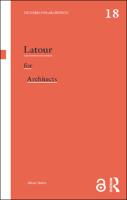Latour for Architects
Proposal review
Abstract
Bruno Latour is one of the leading figures in Social Sciences today, but his contributions are also widely recognised in the arts. His theories ‘flourished’ in the 1980s in the aftermath of the structuralism wave and generated new concepts and methodologies for the understanding of the social. In the past decade, Latour and his Actor-Network Theory (ANT) have gained popularity among researchers in the field of architecture.
Latour for Architects is the first introduction to the key concepts and ideas of Bruno Latour that are relevant to architects. First, the book discusses critically how specific methods and insights from his philosophy can inspire new thinking in architecture and design pedagogy. Second, it explores examples from architectural practice and urban design, and reviews recent attempts to extend the methods of ANT into the fields of architectural and urban studies. Third, the book advocates an ANT-inspired approach to architecture, and examines how its methodological insights can trace new research avenues in the field, reflecting meticulously on its epistemological offerings.
Drawing on many lively examples from the world of architectural practice, the book makes a compelling argument about the agency of architectural design and the role architects can play in re-ordering the world we live in. Following Latour’s philosophy offers a new way to handle all the objects of human and nonhuman collective life, to re-examine the role of matter in design practice, and to redefine the forms of social, political and ethical associations that bind us together in cities.
Keywords
Actor-Network Theory for Architects;Actor-Network-Theory;Bruno Latour;Cosmos and Cosmopolitics;Invisible Cities;Symmetric Anthropology;Thinkers for ArchitectsDOI
10.4324/9780429328510ISBN
9780367348618, 9780367348632, 9781000546538, 9780429328510Publisher
Taylor & FrancisPublisher website
https://taylorandfrancis.com/Publication date and place
2022Imprint
RoutledgeSeries
Thinkers for Architects,Classification
Architecture
Philosophy


 Download
Download Web Shop
Web Shop